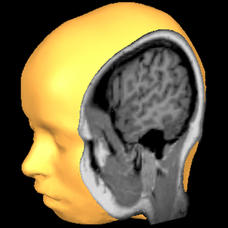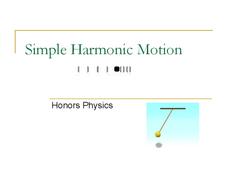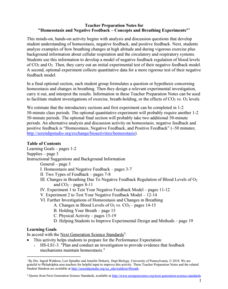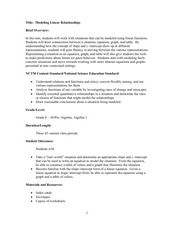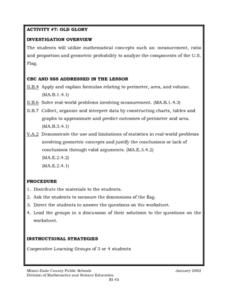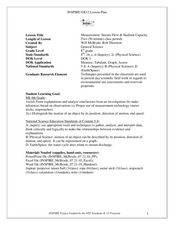Alabama Learning Exchange
The Water Cycle
Learners identify the stages of the water cycle. They listen to the book "Magic School Bus: Wet All Over," examine the Build Your Own Water Cycle website, predict and measure the amount of water in a jar for a week, and read a short play...
Curated OER
Cell Works
Learners observe slides of cork cells and discuss the use of microscopes. They view a power point presentation on "Looking Inside Cells" and take notes aligned with the PPT presentation. They collaborate with a partner to create an...
Curated OER
Creating/Improving the International Space Station
Students research space and gravity and understand the difficulties humans have while on the International Space Station. In this space lesson plan, students listen to personal accounts of astronauts on videos and present designs to...
Curated OER
Reasons for the Seasons
This worksheet requires the pupils to follow a teacher activity, so more-than-the-usual preparation for a practical is needed. Looking at a globe as it rotates and receives "sunlight" from a flashlight, pupils are able to observe the...
Curated OER
Chapter 13 Review, Section 2: Ions in Aqueous Solutions and Colligative Properties
Here is a general chemistry worksheet that incorporates practical applications. Four questions employ critical thinking about solutions, boiling and freezing points, and molar mass. Your class will practice what they learn in class by...
Rainer Goebel
Brain Tutor 3D
The human brain is staggeringly complex, and its structure can seem impossible to grasp. This user-friendly app allows for exploration of the brain's anatomy, providing nomenclature, 3-D mapping, and functions.
Curated OER
Simple Harmonic Motion
Back and forth, and back again. A presentation on harmonic motion would make a great backdrop for a directed instruction lesson in Honors Physics. It includes diagrams, formulas, graphs, and a few sample problems.
InqueryPhysics
Interpreting Motion Graphs
Every movement in the world can be measured and even motionless objects can be significant indicators of movement. Focus on motion graphs that feature distance vs. time, speed vs. time, and positive and negative acceleration.
Herff Jones Education
Reaction Rates
Equip pupils with tools to determine reaction rates as they explore conditions that cause a reaction to increase or decrease. They also discuss why this occurs and predict the next steps as they take part in a series of experiments.
Beyond Benign
Green"er" Precipitation Reaction
All sodium carbonate may not have the same amount of carbonate, but it should have the same percent. Learners write and balance an equation to predict the chemical reaction between sodium carbonate and zinc acetate. Through the lab...
Serendip
Homeostasis and Negative Feedback – Concepts and Breathing Experiments
More asthma attacks happen at higher altitudes, but why? Scholars complete worksheets, learning about homeostasis and feedback related to breathing. Then, they work in small groups to experiment with breathing in limited amounts of...
University of Kansas
Newspaper in the Classroom
Newspapers aren't only for reading—they're for learning skills, too! A journalism unit provides three lessons each for primary, intermediate, and secondary grades. Lessons include objectives, materials, vocabulary, and procedure, and...
Curated OER
Algebra 1
Students study the functional relationships of a variety of problems. In this functional relationship lesson, students determine the dependent and independent quantities of a given set of data. Students record the data and write it in...
Perkins School for the Blind
Friction
Friction is a force that can be felt, which means that learners with visual impairments can experiment to feel and understand the concept of friction. They slide a rock along a smooth table, and then they slide a rock across sandpaper,...
Curated OER
Modeling Linear Relationships
Young scholars graph lines using the slope and y-intercept. In this algebra lesson, students create data using tables and equations. They use their data to make predictions and draw conclusion.
Curated OER
Old Glory
Learners utilize mathematical concepts such as: measurement, ratio and proportion and geometric probability to analyze the components of the U.S. Flag. They collect, organize and interpret data by constructing charts, tables and graphs...
Curated OER
How Alike Are We?
Fourth graders find the range, mode, median, and mean for each of the data sets (height and shoe size). They discuss which measure of central tendency for each data set best represents the class and why. Students graph the shoe size and...
Curated OER
Ocean Life: A Heavy Subject
Second graders examine The Learning Page Fact Files about ocean life and categorize the data by weight and group. They distinguish between fish, mammals, and invertebrates and which weigh the most and the least. Students record their...
Curated OER
Echinacea No Cure all for Kids
Students look at real data and answer the question of whether or not they would recommend Echinacea to cure a cold. In this investigative instructional activity students describe whether the data supports the hypothesis that echinacea...
Curated OER
Energy Conservation Lesson 1: Fossil Fuels and the Ticking Clock
Students explore energy production by participating in a class discussion. In this renewable energy lesson, students discuss the differences between solar, coal, wind and fossil fuel energy sources and why some are better for the...
Curated OER
Measurement: Stream Flow & Stadium Capacity
Eighth graders study the scientific fields and how information can be monitored and recorded. For this scientific inquiry lesson students view a PowerPoint presentation and complete a hands on activity.
Curated OER
CAN'T TOUCH THIS!
Young scholars discover the best practical shielding material when dealing with radioactive substances. They draw conclusions based on availability of materials, price, and best shielding properties.
Curated OER
TIMS, The Bouncing Ball: Math, Science, Measurement, Graphs, Variables
Students determine the exact relationship between the height from which a ball is dropped and the distance that it rebounds.
Curated OER
Bounce Back Ball
Fifth graders work in teams of four to measure the rebound heights of a tennis ball dropped from four different heights. They investigate with the bouncing balls to measure changes in the type of energy they possess.







